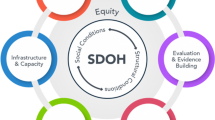Abstract
Engaging community members in efforts to reduce cancer-related health disparities through community mini-grant programs has been shown to have meaningful impact. A predominantly African-American church in South Carolina was awarded a community mini-grant to increase awareness about colorectal cancer (CRC) screening among disproportionally high-risk African-American communities through culturally appropriate arts-based cancer education. The church’s pastor, health and wellness ministry, and drama ministry created a theatrical production called Rise Up, Get Tested, and Live. Over 100 attendees viewed the play. A pre/post-test evaluation design assessed the effectiveness of the production in increasing participants’ knowledge about CRC and examined their intentions to be screened. Results showed increased knowledge about CRC, increased awareness and understanding about the importance of CRC screening, and favorable intentions about CRC screening. Findings suggest that arts-based cancer education may be an effective tool for the dissemination of information about CRC screening.
Similar content being viewed by others
References
Centers for Disease Control and Prevention (2017) Colorectal cancer rates by race and ethnicity. https://www.cdc.gov/cancer/colorectal/statistics/race.htm. Accessed 1 Oct 2017
Siegel RL, Miller KD, Fedewa SA, Ahnen DJ, Meester RGS, Barzi A, Jemal A (2017) Colorectal cancer statistics, 2017. CA Cancer J Clin 67:177–193
American Cancer Society (2016) Cancer facts & figures for African Americans 2016–2018. American Cancer Society, Atlanta
U.S. Preventive Services Task Force (2016) Screening for colorectal cancer: U.S. Preventive Services Task Force Recommendation Statement. JAMA 315:2564–2575
Williams R, White P, Nieto J, Vieira D, Francois F, Hamilton F (2016) Colorectal cancer in African Americans: an update. Clin Transl Gastroenter 7:e185
Sly JR, Edwards T, Shelton RC, Jandorf L (2013) Identifying barriers to colonoscopy screening for nonadherent African American participants in a patient navigation intervention. Health Educ Behav 40:449–457
Hoffman AS, Lowenstein LM, Kamath GR, Housten AJ, Leal VB, Linder SK, Jibaja-Weiss ML, Raju GS, Volk RJ (2017) An entertainment-education colorectal cancer screening decision aid for African American patients: a randomized controlled trial. Cancer 123:1401–1408
May FP, Glenn BA, Crespi CM, Ponce N, Spiegel BMR, Bastani R (2016) Decreasing black-white disparities in colorectal cancer incidence and stage at presentation in the United States. Cancer Epidemiol Biomark Prev 26(5):762–768. https://doi.org/10.1158/1055-9965.epi-16-0834
Alema-Mensah E, Smith SA, Claridy M et al (2017) Social networks as predictors of colorectal cancer screening in African Americans. J Ga Public Health Assoc 6:369–337
Daguise VG, Burch JB, Horner MJ et al (2006) Colorectal cancer disparities in South Carolina: descriptive epidemiology, screening, special programs, and future directions. J S C Med Assoc 102:212–220
McCracken JL, Friedman DB, Brandt HM et al (2013) Findings from the community health intervention program in South Carolina: implications for reducing cancer-related health disparities. J Cancer Educ 28:412–419
Kegler MC, Carvalho ML, Ory M, Kellstedt D, Friedman DB, McCracken JL, Dawson G, Fernandez M (2015) Use of mini-grant to disseminate evidence-based interventions for cancer prevention and control. J Public Health Manag Pract 21:487–495
Wiebel V, Welter C, Aglipay GS, Rotherstein J (2014) Maximizing resources with mini-grants: enhancing preparedness capabilities and capacity in public health organizations. J Public Health Manag Pract 20:S83–S88
Cameron AW, Causey ST, Livingston JN, Brandon DT, Brinson LC, Flournoy Floyd MW (2012) Fourth and a mile: using theater in comparison to workshop/lecture as an approach to educating African American men about prostate cancer. World Medical Health Policy 4:47–69
Livingston JN, Merryweather J, Mohabir J et al (2014) Dramatic plays as a tool to educate young African-American females about HIV/AIDS. J Health Dispar Res Pract 7:1–9
Livingston JN, Smith NP, Mills C, Singleton D, Dacons-Brock K, Richardson R, Grant D, Craft H, Harewood K (2009) Theater as a tool to educate African Americans about breast cancer. J Canc Educ 24:297–300
Smith N, Livingston J, Dacons-Brock K et al (2010) Theater as a tool to educate African Americans about HIV/AIDS: the role of historically black colleges in addressing the AIDS epidemic in the African American community. Afr Am Res Perspect 11:65–81
Heiney S (1995) The healing power of story. Oncol Nurs Forum 22:899–904
Reed CA, Livingston J, Williams A et al (2015) The exploration of theater as innovative tool to improve hiv rates among black men. J Black Sex Relatsh 1:75–96
Friedman DB, Owens OL, Jackson DD, Johnson KM, Gansauer L, Dickey J, Miller R, Payne J, Bearden JD, Hebert JR (2014) An evaluation of a community-academic-clinical partnership to reduce prostate cancer disparities in the South. J Cancer Educ 29:80–85
Simpkinson C, Simpkinson A (eds) (1993) Sacred stories: a celebration of the power of story to transform and heal. Harper, San Francisco CA
Palacios JF, Salem B, Hodge FS, Albarrán CR, Anaebere A, Hayes-Bautista TM (2015) Storytelling: a qualitative tool to promote health among vulnerable populations. J Transcult Nurs 26:346–353
Houston TK, Allison JJ, Sussman M, Horn W, Holt CL, Trobaugh J, Salas M, Pisu M, Cuffee YL, Larkin D, Person SD, Barton B, Kiefe CI, Hullett S (2011) Culturally appropriate storytelling to improve blood pressure. Ann Inter Med 154:77–84
Dugas-Crawford C (1999-2000) Taste and see the god of your ancestors: drama in the African-American church. J Interdenominat Theolog Center 27:183–195
Cueva M, Dignan M, Kuhnley R (2012) Readers’ theatre: a communication tool for colorectal cancer screening. J Cancer Educ 27:281–286
Rustveld LO, Valverde I, Chenier RS, McLaughlin RJ, Waters VS, Sullivan J, Jibaja-Weiss ML (2013) A novel colorectal and cervical cancer education program: findings from the community network for cancer prevention Forum Theater program. J Cancer Educ 28:684–689
Acknowledgements
We acknowledge Dr. Thurmond Bowens, Jr. and Jewel Golden-Wright from Trinity Baptist Church, and Ms. Kim Hale from the American Cancer Society.
Funding
This study was funded by the South Carolina Cancer Prevention and Control Research Network under Cooperative Agreement Number U48/DP005000-01S2 from the Centers for Disease Control and Prevention (Prevention Research Centers) and the National Cancer Institute.
Author information
Authors and Affiliations
Corresponding author
Rights and permissions
About this article
Cite this article
Friedman, D.B., Adams, S.A., Brandt, H.M. et al. Rise Up, Get Tested, and Live: an Arts-Based Colorectal Cancer Educational Program in a Faith-Based Setting. J Canc Educ 34, 550–555 (2019). https://doi.org/10.1007/s13187-018-1340-x
Published:
Issue Date:
DOI: https://doi.org/10.1007/s13187-018-1340-x




